For Letters 1 to 10, please visit my webpage:
Cursive script: Shi Qi Tie (The Seventeenth) of Wang Xizhi 王羲之十七帖 (Part 1)
11 Qi Shi Tie (七十帖)


足下今年政七十耶? 知體氣常佳,此大慶也,想復懃加頤養。吾年垂耳順,惟之人理,得爾以為厚幸,但恐前路轉欲逼耳,以爾要欲一遊目汶領,非復常言。足下但當保護,以俟此期。勿謂虛言,得果此緣,一段奇事也。
Are you turning seventy this year? I know your body is still in good shape. This worth celebrating. I trust you will pay more attention to maintain good health. I am approaching sixty. Generally speaking, I consider myself very blessed, living to this age. I know my life is getting short. I long to climb up Wenling (汶嶺) but this is not easy. Please take good care of yourself so as to wait for the day to climb up the mountains. Do not let it become empty words. If this event really happens, it can be regarded as a wonder.
12 Qiong Zhu Tie (邛竹帖)


去夏,得足下致邛竹杖,皆至。此士人多有尊老者,皆即分布,令知足下遠惠之至。
Last summer we got the Qiong Zhu (邛竹) staffs that you (Zhou Fu 周撫) sent us (from Shu 蜀).
The phase 此士人多有尊老者 can be interpreted in two ways.
i We have a lot of respectable elderly person.
ii Scholars here have the custom of respecting elderly.
皆即分布,令足下遠惠之。
The staffs have been distributed out immediately letting the elderly know your compliments from afar.
13 Shu Du Tie (蜀都帖)

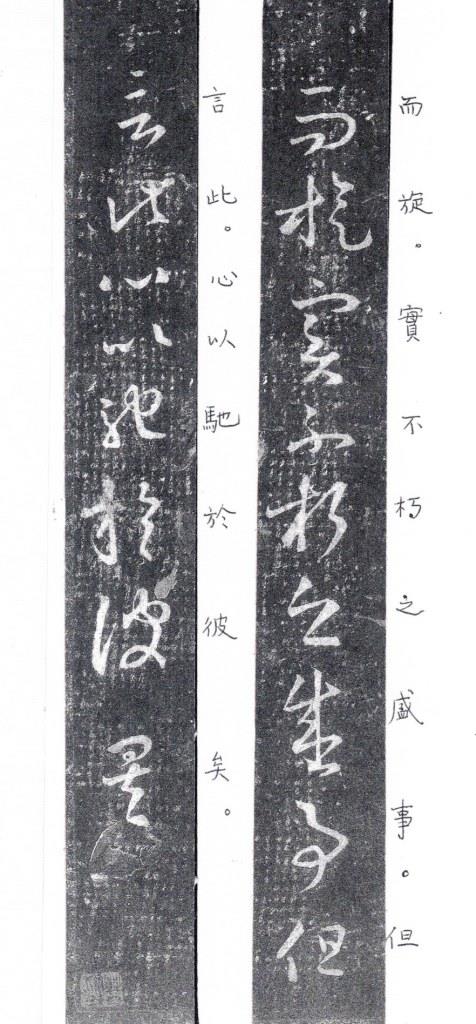
省足下別疏,具彼土山川諸奇,楊雄蜀都、左太沖三都,殊為不備悉。彼故為多奇,益令其遊目意足也。可得果,當告卿求迎,少人足耳。至時示意。遲此期,真以日為歲。想足下鎮彼土,未有動理耳。要欲及卿在彼,登汶領(嶺)峨眉(嵋)而旋,實不朽之盛事!但言此,心以(已)馳於彼矣!
I have read your other letter detailing the marvels and wonders of the mountains and rivers at your place (the land of Shu 蜀). Even Yang Xiong’s Shu Du Fu (楊雄蜀都賦) nor Zuo Taichong’s San Dou Fu (左太沖三都賦) cannot match your thorough descriptions. Your place is full of wonders and it increases our anticipation to visit it. If I can come, I will ask you to send a few people, not too many, to pick me up. When the time comes, I will let you know. Waiting for this day to come, a day really feels like as long as a year. I believe you are guarding the place strongly and do not have any plan to relocate. I will catch up with you at your place, climbing up Wen Ling (汶嶺) and Emei (峨眉). This will be a uniquely fabulous event. Just talking about it, my heart has already rushed to you.
14 Yan Jin Tie (鹽井帖)

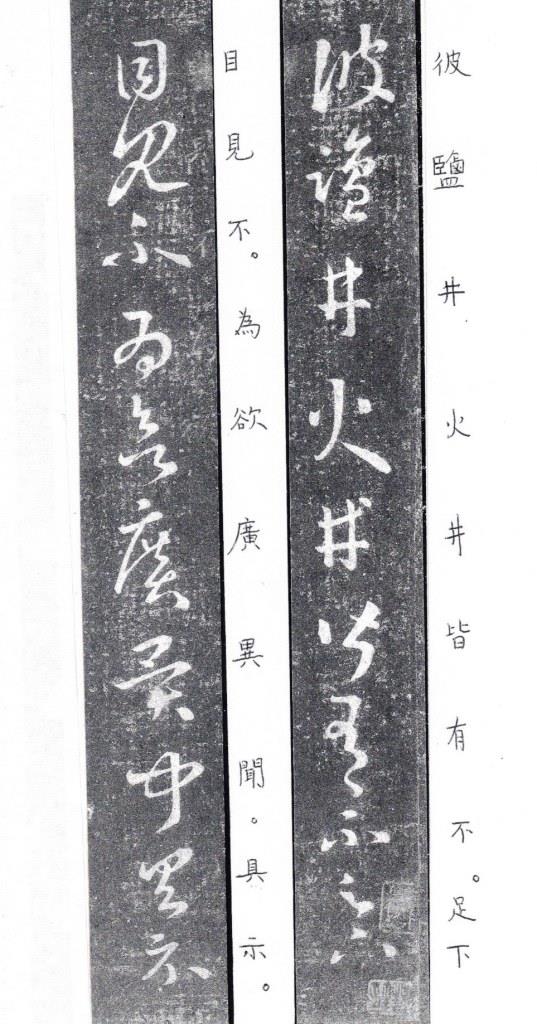
彼鹽井、火井皆有不(否)?足下目見不(否)?為欲廣異聞,具示!
Does your place have any salt wells or natural gas wells? Have you seen any with your own eyes? I wish to broaden my horizon on novel and exotic things.
15 Yuan Huan Tie (遠宦帖)


省別具,足下小大問為慰。多分張,念足下懸情!武昌諸子亦多遠宦。足下兼懷,並數問不(否)?老婦頃疾篤,救命恒憂慮。餘粗平安。知足下情至!
I have read your letter (Zhou Fu’s 周撫) elsewhere expressing your concern for my family. Members of my family have separated and are now living in different places. I am grateful for your kind concern. Wuchang (武昌) and others (members of Tao Kan’s 陶侃 family) have also been allocated to different government posts in various distant places. You also miss them, don’t you? Have you written to them ?
My old wife (Xi Xuan 郗璇) is recently suffering from serious ailments. She is on medical treatment and I worry about her all the time. Everyone else is more or less fine. Thank you so much for your kindness.
(Tao Kan 陶侃 is guarding Wuchang (武昌) at that time. Zhou Fu’s sister is Tao Kan’s daughter-in-law.)
16 Dan Xi Tie (旦夕帖)


旦夕都邑動靜清和。想足下使還,具時(是)州將桓公告,慰情。企足下數使命也。謝無奕外任,數書問,無他。仁祖日往,言尋悲酸,如何可言?
Recently the situation in the capital is quiet and peaceful.
(The following phrases 想足下使還具時州將桓公告慰情企足下數使命也 can be interpreted in 3 different ways depending how to interpret the 2 characters 使還 and where the punctuation are put. )
i 使還 may mean coming back from a mission. The sentences can be translated as follows:
期待你任滿歸來,心中十分掛念。州將桓公十分欣慰,他很器重你,因此才幾次委以重任。I long for your coming back after the mission. Mr Huan (Huan Wen 桓温), the zhou jiang (州將, state general) thinks highly of you and allocated several important tasks to you. He is well pleased with you.
ii 使還 may mean the messenger / postman has come back. The sentences be translated as follows:
想必您的差人已返回詳告了一切。近日收到州將桓温的信,感到很欣慰。聽說桓温很信任您,經常委以重任。I guess your messenger has returned and has told you everything. I received a letter from Mr Huan (Huan Wen 桓温), the zhou jiang (州將, state general), he is well pleased with you and has entrusted you with important tasks.,
iii If the punctuations are put in different places 想足下使還,具時(是)州將。桓公告慰,情企足下數使命也, the sentences may be interpreted as follows:
您(周撫) 這次出使回來,當已具備升任州將的條件了。桓公(桓温) 聞信後表示欣慰,並深切期待你常能擔負起使命來。I believe your return from the mission will sufficiently qualify you to be promoted to the position of zhou jiang (州將, state general), Mr Huan (Huan Wen 桓温) was very pleased hearing the news and he expected you to take up the positions. (I think that this interpretation is quite unlikely.)
Xie Wuyi (謝無奕) is out of town succeeding his elderly brother’s position. He wrote several letters to me and he was fine, nothing special.
Renzu (仁祖) passed away and I visited his family a few days ago. My mind is full of sadness and sorrows, no words are able to express them.
17 Yan Junping Tie (嚴君平帖)

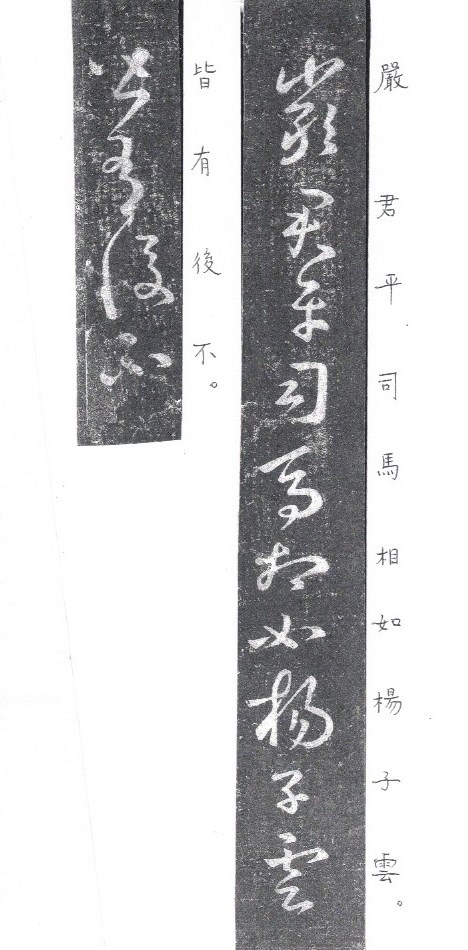
嚴君平、司馬相如、楊子雲皆有後不(否)?
Do Yan Junping (嚴君平), Sima Xiangru (司馬相如), Yang Ziyun (楊子雲), etc. (sages of the Eastern Han 東漢賢者) have descendants (staying in Shu 蜀地)?
18 Hu Mu Tie (胡母帖)
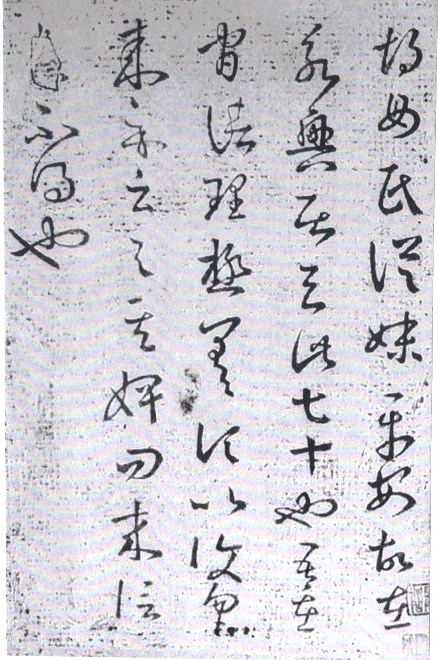

胡母氏從妹平安。故在永興居,去此七十也。吾在官,諸理極差,頃比復匆匆。來示云,與其婢,問來信□不得也。or
胡母氏從妹平安。故在永興居,去此七十也。吾在官,諸理極差,頃比復匆匆。來示云,與其婢問,來信□不得也。
The cousin (the daughter of Wang Dunzhi 王敦之) married to Hu Mu’s (胡母) family is safe and sound. (The 2 characters Hu Mu 胡母 is a surname.) She used to live in Yongxing (永興), about 70 li (里, about 35 km) away from here (Guiji 會稽). My job in the government is not going well and I have been very busy lately. I hastily replied the letter.
The meaning of the sentences 來示云與其婢問來信□不得也 are obscure. Perhaps it may mean:
i In the letter the cousin wrote, she said she has written a letter and has given it to her maid to deliver. I asked the ‘postman’ but there was no response. or
ii In the letter you wrote, you mentioned that the letter has been given to her maid to deliver. I asked the ‘postman’ but there was no response.
iii The punctuation mark may be placed after the character 問. The 4 character together 與其婢問 may mean ‘sending his regards through the maid’. As the cousin is a female, it may be more polite to send the message through the maid than directly to her. The whole sentence 來示云,與其婢問,來信□不得也。means ‘Your letter mentioned that you have sent her the best regards, but I have not yet seen the letter.
Still the meaning of last sentence is unclear.
19 Er Nu Tie (兒女帖)
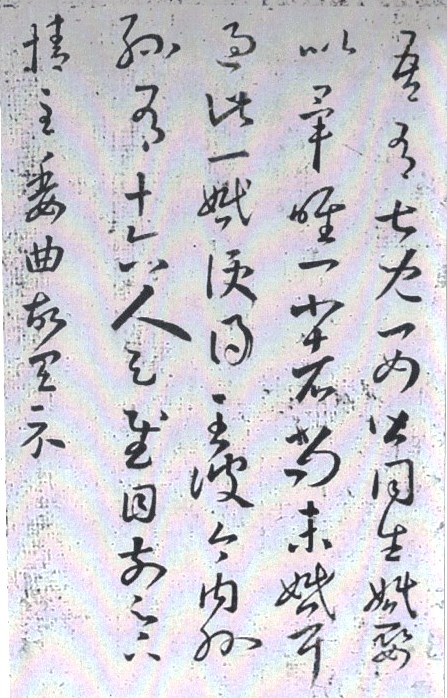
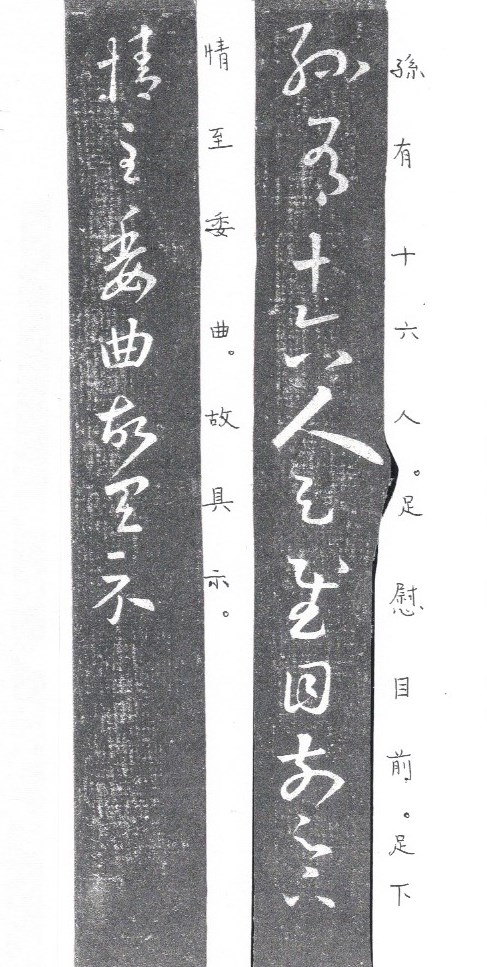
吾有七兒一女皆同生,婚娶以(已)畢,唯一小者,尚未婚耳。過此一婚,便得至彼。今內外孫有十六人,足慰目前。足下情至委曲,故具示。
I have seven sons and one daughter, all of whom were born from the same mother. They are all married, with the exception of my youngest son. Once the youngest son has married, I will leave for your place. At present I have a total of sixteen grandchildren. I am very pleased with my present situation. As you have a deep affection for me, so I tell you (Zhou Fu 周撫) about this in details.
20 Qiao Zhou Tie (譙周帖)
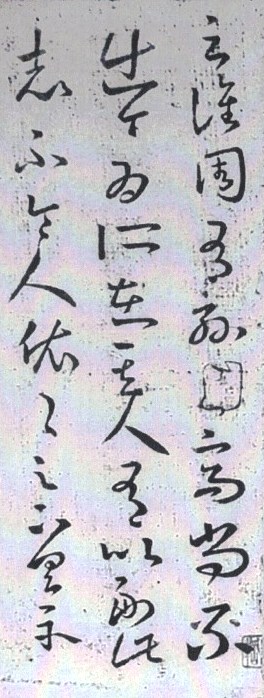

云譙周有孫□ ,高尚不出。今為所在,其人有以副此志不(否)?令人依依,足下具示。
It is said that one of Qiao Zhou’s (譙周) grandson (Qiao Xiu 譙秀) is of high moral character and lives in reclusion, not working for the government. He now resides at your (Huan Wen’s 桓温) location. Is he really the person of such qualities? This matter has always been in my mind. I look forward to your reply.
to be continued…
Please click the following link for letters 21 to 29.
Cursive script: Shi Qi Tie (The Seventeenth) of Wang Xizhi 王羲之十七帖 (Part 3)
Bibliography
https://zh.wikipedia.org/wiki/%E9%83%97%E6%84%94 郗愔 (313-384), 字方回…)
https://zh.wikipedia.org/wiki/%E9%83%97%E6%9B%87 郗曇 (320-361), 字重熙…)
https://zh.wikipedia.org/zh-sg/%E5%91%A8%E6%92%AB 周撫 (?-365), 字道和…)
https://www.sohu.com/a/443385263_584699 (王羲之《十七帖》全集+释文!
https://baike.baidu.com/item/%E5%8D%81%E4%B8%83%E5%B8%96/9400210 (十七帖)
渡邊隆男 (1988) 東晉王羲之 十七帖二種 二玄社ISBN 4-544-00514-0
祁小春 (2010) 王羲之 十七帖 ·湖北美术出版社 ISBN 978-7-5394-3712-5
龙友 王玉池 (2011) 名碑各帖完全大观•王羲之十七帖 江西美术出版上社 ISBN 978-7-5480-0666-4
俞丰 (2009) 經典碑帖釋文譯注, 上海書畫出版社, ISBN 978-7-80725-846-9
蔣勳 (2010) 手帖 南朝嵗月, INK 印刻文學生活雜誌出版有限公司 ISBN 978-986-6377-94-5
Ouyang Z S, W C Fong, Y F Wang (2008) Chinese Calligraphy, Yale University, ISBN 978-0-300-12107-0








